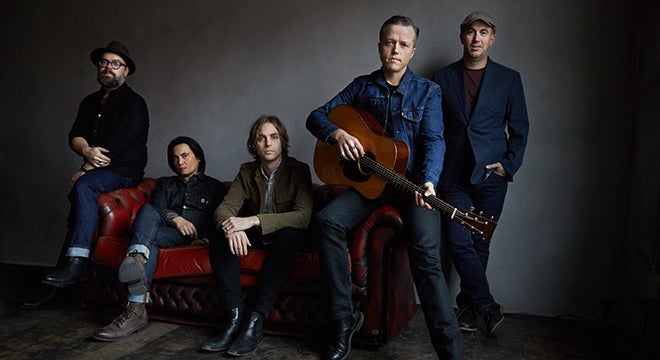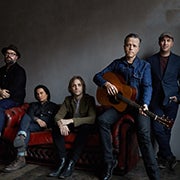
Jason Isbell and the 400 Unit
Jason Isbell and the 400 Unit
with Turnpike Troubadours
About Jason Isbell: Every once in a while, and not that often, a popular musician comes along whose work is both profoundly personal and evocative of the larger moment, merging the specifics of lived experience in a particular time and place to the realities of our shared journey as a community, a people. The work of such artists as Bob Dylan, Neil Young, Bruce Springsteen, and Kurt Cobain – and now Jason Isbell, I would argue, with his new album Something More Than Free – spreads irresistibly outward from the soul, that private well of vision and emotion, into the broader realm of cultural history, sharpening our ability to see, expanding our ability to feel, and restoring our sense that we belong not only to ourselves but to an extended spiritual family. The songs create a space to be together, and closer together than we were before.
To fans and the music press, the personal story surrounding Isbell's last, breakthrough album, Southeastern, is widely known and easily reprised. A troubled young troubadour, newly married, stepped away from the darkness of addiction into a new, uncertain life of clarity and commitment, reflecting ruefully on his hard won victories and the price he paid attaining them. It was an album of aching elegance, marked by the sort of lyrical precision that brought to mind certain literary masters of the melancholy American scene, from Flannery O'Connor to Raymond Carver. By avoiding the hairy-chested bombast of arena country music while crafting music with solid melodic contours Isbell created an album, and a sound, of memorably infectious empathy.
With Something More Than Free, he stretches himself further, greatly expanding the boundaries of Isbell country, that territory of the heart and mind where people strive against their imperfections, and simultaneously against their circumstances, in a landscape that's often unfriendly to their hopes. As always, he starts with the subjects he knows best: the dignity of work, the difficulty of love, the friction between the present and the past. "I found myself going back," he says, explaining the direction he chose to take, "to family and close personal relations." The opening cut, "It Takes a Lifetime", so loose and summery and optimistic, invites us into this circle of kindred souls, instantly making us feel at home. And while Isbell may be singing about himself or someone else whose inner life he's privy to when he mentions fighting 'the urge to live inside my telephone,' isn't that everyone's challenge nowadays?
Once you've cleaned up your act, what should your next action be, and your next? That's one of the questions handled in "24 Frames", the album's bracing second cut, whose narrator seems to be managing life deliberately, step by step, with peril all around. "You thought God was an architect. Now you know/ He's something like a pipe bomb ready to blow." The danger of self-destruction is always near, and the way to defeat it seems to be putting self-seeking and vanity aside and taking the next right action, however simple. "After you've looked your fears in the eye," Isbell tells me on the phone, "What's important now?" Maybe he knows and maybe he's still learning – this isn't an album of easy certainties – but what makes his songwriting so rich and gripping, besides its observational precision, is the honesty of his inquiries. He doesn't flinch. He doesn't cheat.
The album – and it is an album, a unified musical document, not a grab bag of would-be singles ("I don't write songs to be played at sporting events," Isbell cracks) – relaxes and deepens as it goes along, offering some of the pleasures of a fine novel, including a collection of sharp vignettes that stick in the mind, impossible to shake. "Flagship", a spare and haunting meditation on the fragility of long-term love, ranges around a faded, old hotel for images of passion that has cooled. "The lights down in the lobby, they don't shine/ They just flicker while the elevator whines." "Children of Children", a masterful creation that floods the ears with bold and rolling soundscapes reminiscent of CSNY, finds the singer examining old family photos and dwelling on his own unwitting influence on his mother's interrupted youth. "I was riding on my mother's hip/she was shorter than the corn. And all the years you took from her/just by being born." That last line is as devastating as they come, a thought that, once voiced, can't be forgotten – and that we're surprised wasn't voiced before. Isbell's songwriting is like that, at its most poetic when it's most plainspoken. His lines and his lyrics fall into place like the tumblers of a lock.
The title track, which he tells me on the phone was inspired by his father -- a hard-working man who won't let up -- is more than a tribute to a beloved parent; it speaks to the outlook of a generation that has seen, in Isbell's words, "The American dream go from the light at the end of a tunnel to all tunnel." As usual, Isbell travels outward from the specific case to a more comprehensive human perspective. "I start with an individual, he says, "and then I try to write for everybody." The song nails its subject from the moment it begins. "When I get home from work, I'll call up all my friends/ and we'll bust up something beautiful we'll have to build again." The man in question, a born provider who finds himself on Sunday "too tired to go to church," is politically conscious of his situation ("The hammer needs the nail, and the poor man's up for sale") but grateful for what he's able to bring home. In this, he's like Isbell, who told me that in his writing he tries "to be angry without being bitter and emotional without being maudlin." He probably doesn't have to try too hard. For all the darkness that leaks into his songs (only because it exists out in the world) Isbell's fundamental orientation is still toward the light, even when it's fast receding. His humanity has an almost uncanny feel, as though he's lived three lives for everybody else's one. He believes in the basic power of his vocation as a writer, singer, player, and artist to conjure wholeness from a world of fragments. He's the musician we need now, and whom we've waited for: candid, vulnerable, outraged, literate, and just romantic enough to carry on in a period of rising disenchantment. His time has come, and so has ours. Listening to Isbell we also hear ourselves.
SHOWINGS
This event has already occurred.





